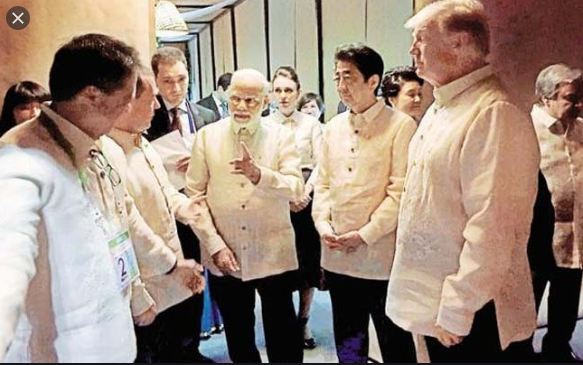Virendra Pandit
New Delhi: A week is a long time in politics and a month eternity. Few realize it better than China. In the last seven days flat, a sweating Beijing has felt extreme heat from two hotspots it was trying to encroach upon: India and Taiwan. So much so that all its best-laid-plans may have come to naught and its bullying bravado was gone.
The recent developments after the 2+2 ministerial dialogue between the US and India have completely unnerved China. Its embassy in New Delhi issued a “solemn statement” against US Secretary of State Mike Pompeo and Secretary of Defense Mark Esper for “openly attacking China and the Communist Party of China” during their India visit—actually this nervousness is due to the defense heft India is going to get from America.
The Dragon’s flexing of muscles—wherever they are!—has inadvertently pushed the US and India to accelerate the two nations’ strategic and defense partnership the 2+2 dialogue within two years, something that may have taken many more. In other words, Beijing has successfully and quickly united Washington and New Delhi against itself at breakneck speed!
Also, how nervous China is over the ‘Asian NATO’ fast taking shape under the US umbrella—with India, Australia, and Japan already in via the Quadrilateral Security Dialogue (Quad), and others around Beijing showing willingness to join—was betrayed when Beijing accused America of “instigating China’s relations with other countries” and that the “border dispute of China and India is bilateral”—meaning that the US should keep off from this.
On Ladakh, China is in a Catch-22 dilemma. Or it’s a Sophie’s Choice—any of the two alternatives is worse than the other. If it signs a peace deal with India and returns its forces, it will be a huge foreign policy and defense meltdown internationally and personally to its President-for-Life Xi Jinping—giving his detractors in the Communist Party a big boost to remove him from the post. If it does not, it further pushes India into the American camp and set up the ‘Asian NATO’ sooner than later.
For now, Beijing is not yet ready to disembark from the high horse it is astride in Ladakh, nor allowing any substantive progress in border talks lest it loses face. Ladakh has emerged as the test case for China’s muscular threats—it had not bargained for a tough Indian response and a long standoff.
That the increasing US-India defense cooperation is set to alter the balance of power and terror, and even equalize the technological component of the two neighbors’ armed forces, is something China had not thought of even a month ago.
Feeling the heat, China’s mouthpiece Global Times, which was issuing all kinds of wild threats to New Delhi since mid-2020, came down to sermonize India. It ‘advised’ India that, abandoning its “traditional diplomatic alignment and moving closer to the US”, was “unwise”, and that “India’s status in the eyes of developing countries has, apparently, “greatly diminished and its strategic focus of a traditional geopolitical power gradually lost.”
But the biggest cause for China’s nervousness came not from the Quad/Asian NATO, or India, but from the self-governed Republic of Taiwan which Beijing claims as its own breakaway overseas territory and threatens to retake it by force.
Just after signing a major arms deal with the US, Taiwan said the new weapons will help it achieve its goal of being able to destroy “half of any (Chinese) PLA invasion force by 2025.”
This week’s USD 2.4 billion arms deal includes 400 Harpoon anti-ship missiles, 100 launcher transporters, radar, and other support systems which will help strengthen the coastal defense of entire Taiwan. The latest arms deal between the US and Taiwan is the second in a week and the ninth approved since Donald Trump became the US President in January 2017.
Taiwan’s Deputy Defence Minister Chang Che-ping said about the 2025 target: “We hope to increase the number (of missiles) so that we can build up our combat power before then,” media reports said.
Just before Monday’s missile deal was announced, Beijing announced to impose ‘sanctions’ on Lockheed Martin, Boeing Defence, Raytheon, and other US companies it said were involved in earlier arms sales to Taiwan.
Taiwan is amused at this China climb-down.
“We need to defend ourselves, so when we develop our capability we try to be hedgehog-like. When a lion tries to swallow a hedgehog, it will hurt – so no lion will try to swallow a hedgehog,” said an official.

